|
Number 751, 2004 by Sherry Holbus |
KENTUCKY BLUEGRASS
|
General Information
Legal Cluster Bio-Geographic Cluster Trade Cluster Environment Cluster Other Clusters |
|
Number 751, 2004 by Sherry Holbus |
KENTUCKY BLUEGRASS
|
General Information
Legal Cluster Bio-Geographic Cluster Trade Cluster Environment Cluster Other Clusters |
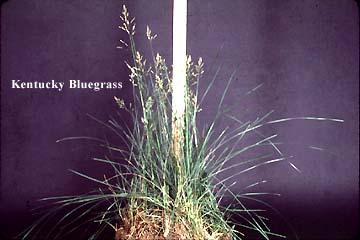

1. The Issue
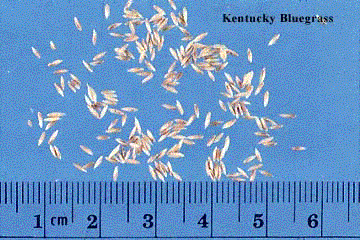
Copyright © 1997 Purdue University Agronomy Extension
2. Description
Kentucky bluegrass is native to practically all of Europe, northern Asia and the mountains of Algeria and Morocco. The species is spread over all of the cool, humid parts of the U.S.
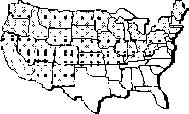
copyright © Richard Duble
In the southern U.S., Kentucky bluegrass is limited to the transition zone from North Carolina, through much of Tennessee, northern Arkansas to the panhandle of Texas and Oklahoma. In the western states, Kentucky bluegrass is grown with irrigation.
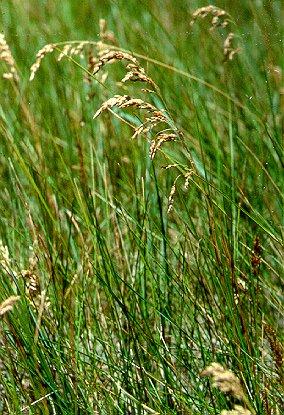
Kentucky bluegrass is actually an Old World grass, Poa pratensis, that possibly arrived in this country as hayloft sweepings saved for planting pasture (Field Crops by Howard C. Rather (New York: McGraw-Hill, 1942), pages 4 and 124. Compared to the warm season grasses, Kentucky bluegrass has a high water requirement. As much as 2 inches of water per week are needed to keep bluegrass green and growing during summer months in the transition zone.
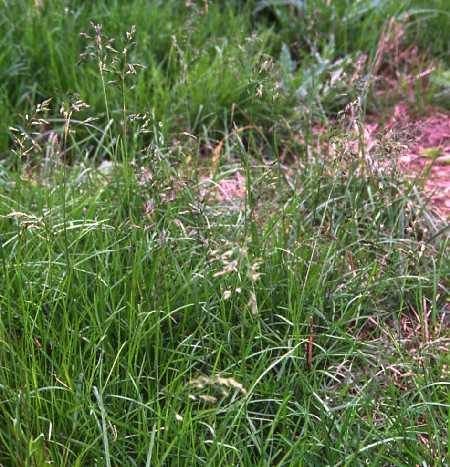
Over 100 varieties of Kentucky bluegrass have been developed
during the past 25 years. Some varieties tolerate southern climates better than
others (Adelphi, Baron, Fylking, Glade, Midnight, Ram I, Vantage, Victa and
Warrens A-34), some have moderate shade tolerance (Bristol, Glade, Nugget and
Touchdown), and some tolerate closer mowing (Adelphi, Bristol, Ram I and Touchdown).

copyright www.agry.purdue.edu
Kentucky bluegrass helps prevent
erosion control on uplands with its dense vigorous root system and the sod that
it forms. Bluegrass is an important pasture plant. Bluegrass is also rotated
with tobacco to help the soil recover.
http://extension.usu.edu/rangeplants/Grasses/kentuckybluegrass.htm
3. Related Cases: Here are some related cases to the Kentucky Bluegrass issue...
Havens : Bruce Sterling is popularly credited with coining the term "Data Haven", for concentrations of illicit data in computer servers that reside beyond copyright protection law. This case study will examine, by looking at a specific Data Haven and the larger issues that surround Data Havens, whether Data Havens are a potential threat to the global intellectual property regime and whether or not Data Havens, as they currently exist pose an actual threat to said regime.
Slave: No issue has been more controversial and divisive in the first 100 years of the American republic than that of slavery. While slavery was not officially abolished until the ratification of the 13th, 14th and 15th Amendments to The Bill of Rights in 1865, our national leaders had fought over various aspects of slavery since the Constitutional Convention.
Cybersit: The recent publicity regarding the 'illegal' registration of Internet domain names or 'cybersquatting' has given rise to many high profile legal battles. Companies such as E-toys, and TNN (owned by CBS), Governments, companies and even the NFL have all been involved in domain name cases. However, a bulk of thse cases have taken place in the United States, where legal frameworks, even though still somewhat embryonic in this area, generally tend to be more coherent than in many other countries. The issue of domain name registration gives rise to many other issues.
Budweis: This issue involves the United States and the Czech Republic. For the past hundred years, an international legal dispute has persisted between the American brewer Anheuser-Busch and the Czech beer producer Budejovicky Budvar over the right to use the trademark name Budweiser on their products. Currently, both of the brewers produce beer labeled Budweiser, and continue to battle over who owns the legal right to the commercial use of this name.
Irishmusic: On the 26th of January 1999, The European Communities (EC) and their Member States (MS) have requested the opening of a formal dispute settelment in the World Trade Organization (WTO) relating to the American Copyright System. The EC is disputing section 110 (5) of the 1976 US Copyright Act that exempts resturants, bars, or other places that play music for the public from payment of royalty fees to the original artists for the music played.
Grappa: That tradition matters in the global age has become obvious in the case of grappa, an alcoholic drink that has not only become popular lately, but that has also become the bone of contention between the European Union and South Africa.
Scotch: The underlying issue in this case study concerns the labelling processes for internationally marketed products named for the region, area, or nation where they are produced. Naming a specific commodity for the culture, region, or area from which the item was produced has created some controversy in recent years. In this respect, Scotland has successfully been able to obtain sole ownership of the label "Scotch" for its most famous export, Scotch Whisky.
Basmati: In late 1997, an American company RiceTec Inc, was granted a patent by the US patent office to call the aromatic rice grown outside India 'Basmati'. RiceTec Inc, had been trying to enter the international Basmati market with brands like 'Kasmati' and 'Texmati' described as Basmati-type rice with minimal success. However, with the Basmati patent rights, RiceTec will now be able to not only call its aromatic rice Basmati within the US, but also label it Basmati for its exports.
Feta2: In a recent European ruling, feta cheese was recognized by the European Community as a Greek branded product under the Protected Designation of Origin (PDO) status. The battle for feta has gone on for thirteen years because of challenges with other European Union nations. Denmark, France, and Germany also produce cheese under the name of feta. The new PDO ruling will benefit Greek farmers who had previously faced market competition from these other nations.
Banana2: The United States and the European Union are involved in a trade dispute settlement through the World Trade Organization regarding the sale of bananas by American companies to member states in the EU. The European Union has been called on by the WTO to reform their practices of agriculture to comply with international trade law.
4. Author and Date: Sherry Holbus July 2004

5. Discourse and Status:
Trading Kentucky Bluegrass seed is much like trading software, there are owner copyright laws and intellectual property rights that dictate who is allowed to sell and name the product. Under the oversight of the World Trade Organization, Canada has a main dedicated intellectual property laws and regulations agreement. This international trade measure reproduces the Plants Breeders Rights regulations for Canada. This measure gives Canada the authority to issue licenses for different varieties of Kentucky Bluegrass within their territory.
However, within the United States, the Department of Agriculture has the power to issue certificates of protection to developers of new varieties of Kentucky Bluegrass seed (as in above). Currently to date, the state of Kentucky has not brought up the case for claiming intellectual property rights to the use of its name in the sale of the differing varieties of the agricultural product.
6. Forum and Scope: World Trade Organization-industry wide www.wto.org
7. Decision Breadth: Multilateral
8. Legal Standing: Undisputed intellectual trademark status

9. Geographic Locations: Present in the temperate zones of the US, Canada, Europe and Austrailia
a. Geographic Domain: Cool temperate moist zones
b. Geographic Site: Kentucky, USA
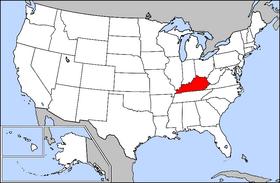
Kentucky is geographically situated to promote the most optimal conditions for the Kentucky Bluegrass. Kentucky has more running water than any other mainland state. The flow of water through Kentucky creates the ideal environment upon which the grass is able to thrive and create a lush and alluring atmosphere. Kentucky’s bluegrass pastures have produced a number of exceptional thoroughbred horses, leading to worldwide recognition in horse racing.
c. Geographic Impact: none
10. Type of Habitat: cool, temperate

12. Type of Measure: Tariff
There is a tariff on Kentucky Bluegrass imported into the United States that is effective from January 1, 2004 until September 30, 2008. This tariff is bound by the World Trade Organization and is listed on the U.S. International Trade Commission 2004 Database. However, the the World Trade Organization does not specify the variety of the crop that is being exported, and this is the central issue to this TED case.
13. Direct v. Indirect Impacts: none
14. Relation of Trade Measure to Environmental Impact: none
15. Trade Product Identification: "Kentucky Bluegrass" Poa pratensis seed for sowing
16. Economic Data
Under normal trade relations, the tariff is 1.2 cents/kg,and duty rate tariff is 11 cents/kg.
17. Impact of Trade Restriction: multilateral
18. Industry Sector: Argriculture- seeds for sowing
19. Exporters and Importers:
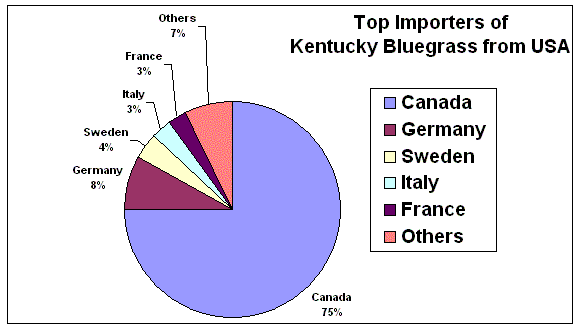
Canada $7,294,214
Germany $801,000
Sweden $360,834
Italy $297,737
France $279,258
Other reporters $697,606
Total Import: $9,730,649
Top Exporters of Kentucky Bluegrass to USA 2003 Canada $395,514
Canadian importation of the seed dominates the world
trade of the product. It is interesting to note that all the countries importing
the product are post-industrial countries. As you can see, the United States
also imports Kentucky Bluegrass seed from other countries, namely two, Canada
and Australia. 20. Environmental Problem Type:
The central issue in trade marking “Kentucky” involves
the seed industry of the state of Kentucky claiming under WTO rules and regulations
that only growers and producers located in the state of Kentucky can market
and distribute seed under the brand name of Kentucky bluegrass. This case would
have to be held at the international level and would involve extensive trade
and industry regulations to get all members and producers to agree and become
signatories of the agreement.
Even though Kentucky bluegrass seed is produced throughout
the cool temperate parts of the United States and Europe, the state of Kentucky
could legally argue before the World Trade Organization that the Latin scientific
descriptor for the seed, "Poa pratensis", translates specifically
as "bluegrass of Kentucky". Therefore, this would legally bind bluegrass
with the name Kentucky, thus connecting the species of the seed to the state
name. The bluegrass seed producers of the state of Kentucky could bring their
case to the international trade forum of the World Trade Organization or the
International Seed Growers Association.
The Kentucky seed growers could also argue that the
integrity of their product is being jeopardized by the ability of other producers
outside of the state of Kentucky to claim that the seed they are producing is
authentically “Kentucky” bluegrass. Even though the seed may be genetically
engineered the same, there are nutrients and supplements specific to the Kentucky
soil that are uniquely linked to producers within the state of Kentucky.
21. Name, Type, and Diversity of Species
Name: Poa pratensis
Kentucky bluegrass is capable of surviving
extended drought periods and can initiate new shoot growth when moisture conditions
improve. Summer dormancy may occur with the above ground foliage becoming brown.
copyright
www.superseedstore.com Type: seed for sowing
Diversity: more than 100 different
species
22. Substitutes: Canadian
Bluegrass
23. Culture:
copyright allthingssouthern.com
Shellie Tomlinson
Kentucky is nicknamed the Bluegrass state for the bluish
purple tinge that can be seen in the rich grass that predominates the landscape.
The color comes from the blue/purple buds the grass produces. Early pioneers
found bluegrass growing on Kentucky’s rich limestone soil, and traders began
asking for the “seed of the blue grass from Kentucky”. The name stuck and today
Kentucky is called the Bluegrass state.
In order to preserve the integrity and cultural tradition
of the Kentucky Bluegrass, it is important that Kentucky be able to regulate
its sale and production. Kentucky bluegrass is not just a crop that grows within
the state’s border’s, it is a major part of the cultural heritage and identity
of the state and of the people through its link with the horse racing industry.
copyright kentuckyderby.com
The first Saturday of each May about 150,000 people
crowd into the infield of Churchill Downs, in Louisville Kentucky to watch some
of the best 3 yr old thoroughbred horses compete. Two Minutes after the start,
the winner is draped in a blanket of red roses while the crowd sings the state
song “My Old Kentucky Home”. This is the cultural tradition of the Bluegrass
state since 1875. The Derby is the first jewel of the Triple Crown, a series
of 3 races spread out over the country in five weeks time. The winners of the
Derby the Preakness and the Belmont become known as the most elite of the breed.
Part of what makes these races unique is that these
horses are so young and have never run so far in their lives. Sir Barton won
all three races of the Triple Crown in 1919, and since then only eleven horses
have been able to repeat such an amazing feat, the last one in 1978. It has
been more than 25 years without a Triple Crown winner, and each year fans return
to the Kentucky Bluegrass state to witness the next great horse, the next Triple
Crown winner.
24. Trans-Boundary Issues:
25. Rights:
intellectual property/ trademarking
26. Relevant Literature
General
Species info Kentucky
state link for bluegrass Plant
Variety Protection Act (1970) Patents
by Dr. Reed at Rutgers
Reporter Title Trade Value
Australia $3,465
Other reporters $0
Total Export $398,979
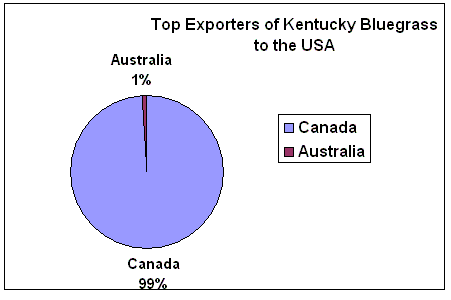

V. Environment Clusters
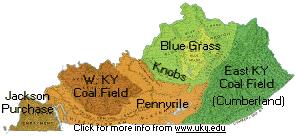
Within the Final Act of the Uruguay round of negotiations from the World Trade
Organization, the rules concerning intellectual property rights were discussed.
A key feature of the Agreement is that Members are required to provide within
their national laws effective procedures and remedies for the enforcement of
rights to the holders of those rights, mainly private enterprises. It is, however,
recognized that members are not obliged to create special judicial system for
the enforcement of IPRs (World Trade Organization).
Specifically, the Kentucky bluegrass TED case could fall under the purview of
Part II of the Agreement on Trade Related Aspects of Intellectual Property Rights
(TRIPS). The second part pertains to trademarks and geographical indications.
The Agreement verbatim states that members are to prevent the use of any indication
which misleads consumers to the origin of goods. Therefore, producers of the
seed within the state of Kentucky could argue that other producers labeling
their seed as “Kentucky” bluegrass are in actuality misleading consumers as
to the origin of the seed.
brands of Kentucky Bluegrass from  :
:




VI. Other Factors
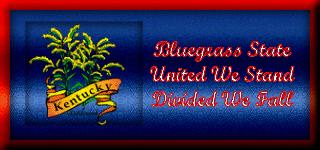

copyright www.bluegrasskentucky.com
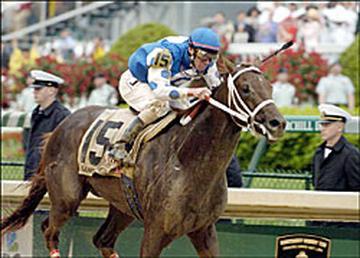
Horse racing is a main part of the cultural life in Kentucky, and stems from
its “bluegrass” atmosphere. It is often purported that the Kentucky Bluegrass
is what makes great horses because it is a major part of their diet. The “Run
for the Roses”, the “Greatest Two Minutes in sports”, all refer to the Kentucky
Derby.
Federal Seed Act
7/2004